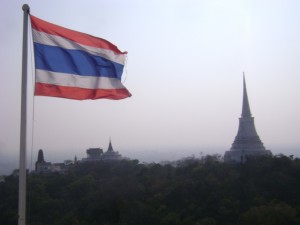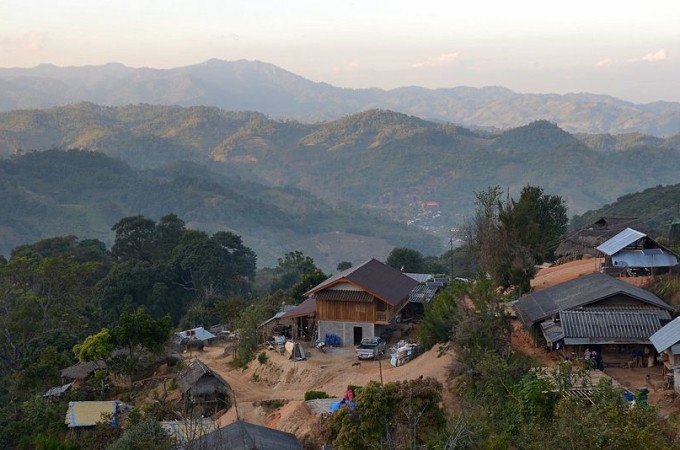Photo by Takeaway – Own work, CC BY-SA 3.0
Sometimes a dream becomes the gateway to the future.
 Thirty-five years ago, Jim and Debbie (not their real names) worked in villages in Thailand where many farmers grew opium. Jim and Debbie wanted to help them find Christ and make an honest living.
Thirty-five years ago, Jim and Debbie (not their real names) worked in villages in Thailand where many farmers grew opium. Jim and Debbie wanted to help them find Christ and make an honest living.
Jim used to sit around the fire with the men at night, drink tea, and visit. He would dream out loud. He talked about his dream, what he could see in his mind that wasn’t real but could be.
One of the things I learned through that experience is that poor people live in the past. Or the present. But they don’t dream about the future. The future is not part of their culture.
In our culture, we ask a young child, “What do you want to be when you grow up?” and they can say anything: a brain surgeon, a fire truck driver … they can say anything and the possibility exists. People aspire to greater things and often achieve them.
But if you ask a child in poverty, “What do you want to be when you grow up?” you only get a blank stare. They don’t understand the question. That’s a cultural difference between our reality and theirs.
Jim would dream aloud, envisioning rows of coffee planted on the hills. His friends from the village didn’t catch the vision. The notion of visualizing things before they exist wasn’t part of their worldview.
But then he had an idea.
One day I took them to another village where my friend was working who had successfully helped the people start a coffee plantation. It was a village a lot like the village we lived in, the same people group, same economic background, same language.
But one thing was different. As we drove into the village we saw rows and rows of coffee plants. We drove up to a shack where a villager lived, and he had a brand new pickup sitting out front. He showed my friends his coffee trees and suddenly the lights came on for them. This man wasn’t a foreigner; he was one of them. He lived like them. He spoke their language.
You could see the wheels turning: “If this guy can do it, we can do it.”
 Jim and his friends went back to their village and started planting coffee.
Jim and his friends went back to their village and started planting coffee.
After a couple of years, Jim and Debbie left that village. In 30 years they had never returned. Until last October, when they had an extra day or two during a trip to Thailand. So they drove to the village. And they had opportunity to see the power of a dream to create a better future.
We didn’t see fields of coffee; the villagers had moved on from that crop, and, what is more important, they had developed their village. Before, only a 4WD could navigate the mud roads. Now the roads were paved. They have electricity in the village. They live in nice houses. They all have a smart phone. They had really escaped poverty.
Thirty years ago, Jim and Debbie had helped erect an “adequate” church building: bamboo walls and a concrete floor. Today, the village boasts a brand-new church building, and an additional three-story structure for youth activities. The church employs several people who work with the kids. And six young people from that village are in various places around the country serving the Lord in ministry.
Where does the human imagination come from, if not the God who made humans in His image? In the whole creation, only the human can dream. A dream is the first step in creating a different reality. When Jim dreamed out loud of coffee as an income-producing crop, there was no alternative to the poppy harvest to make a living. With no alternative to opium production, how else could a breadwinner provide for his family? And yet, today, in Thai villages, families are flourishing without supporting the opium trade.
A culture that fosters dreams is providing for its future. But as Jim learned, there are cultures that have no grasp of the future. There are societies where the default orientation is to the past.
To be sure, history matters. In the words of Spanish philosopher George Santayana (1863-1952), “Those who cannot remember the past are condemned to repeat it.” Yet, where the prevailing tendency in a culture is to regard the past more important than the future, little will happen to improve the lives of people.
Jonas Salk dreamed of a cure for polio to create a better, healthier future for people.
The Wright brothers dreamed of flight as a real, future possibility, Thomas Edison of a reliable light bulb.
Jim’s work to replace poppy fields with coffee farms evokes the dream of another Christ-follower who understood that the status quo can be improved for the glory of God and the blessing of man. I speak of George Washington Carver.
 The son of slaves, Carver persisted in a society not kind to his race. His life is a striking example of the power of imago Dei (image of God) human nature. The first black student at Iowa State Agricultural College, Carver’s thesis was, “Plants as Modified by Man.” From his creative imagination we have been abundantly favored as a society.
The son of slaves, Carver persisted in a society not kind to his race. His life is a striking example of the power of imago Dei (image of God) human nature. The first black student at Iowa State Agricultural College, Carver’s thesis was, “Plants as Modified by Man.” From his creative imagination we have been abundantly favored as a society.
Carver’s reputation is based on his research into and promotion of alternative crops to cotton such as peanuts, soybeans, and sweet potatoes, which also aided nutrition for farm families. He wanted poor farmers to grow alternative crops both as a source of their own food and as a source of other products to improve their quality of life. The most popular of his 44 practical bulletins for farmers contained 105 food recipes using peanuts. He also developed and promoted about 100 products made from peanuts that were useful for the house and farm, including cosmetics, dyes, paints, plastics, gasoline, and nitroglycerin. [Wikipedia. Emphasis added.]
The creative power of a dream unlocks the future.
Your dream may open a door to the future.
How readily do you dare to dream?
- Gary Brumbelow







2 Comments
Oscar
March 2, 2016 - 3:31 pmGary, thank for those thoughts. History is what we make and history is not simply what makes us. Thanks
admin
March 2, 2016 - 4:59 pmYes, Oscar, well said. How much difference we could see if every Christ follower was discipled to understand and pursue that truth!
Thanks for reading and responding.
Gary Brumbelow